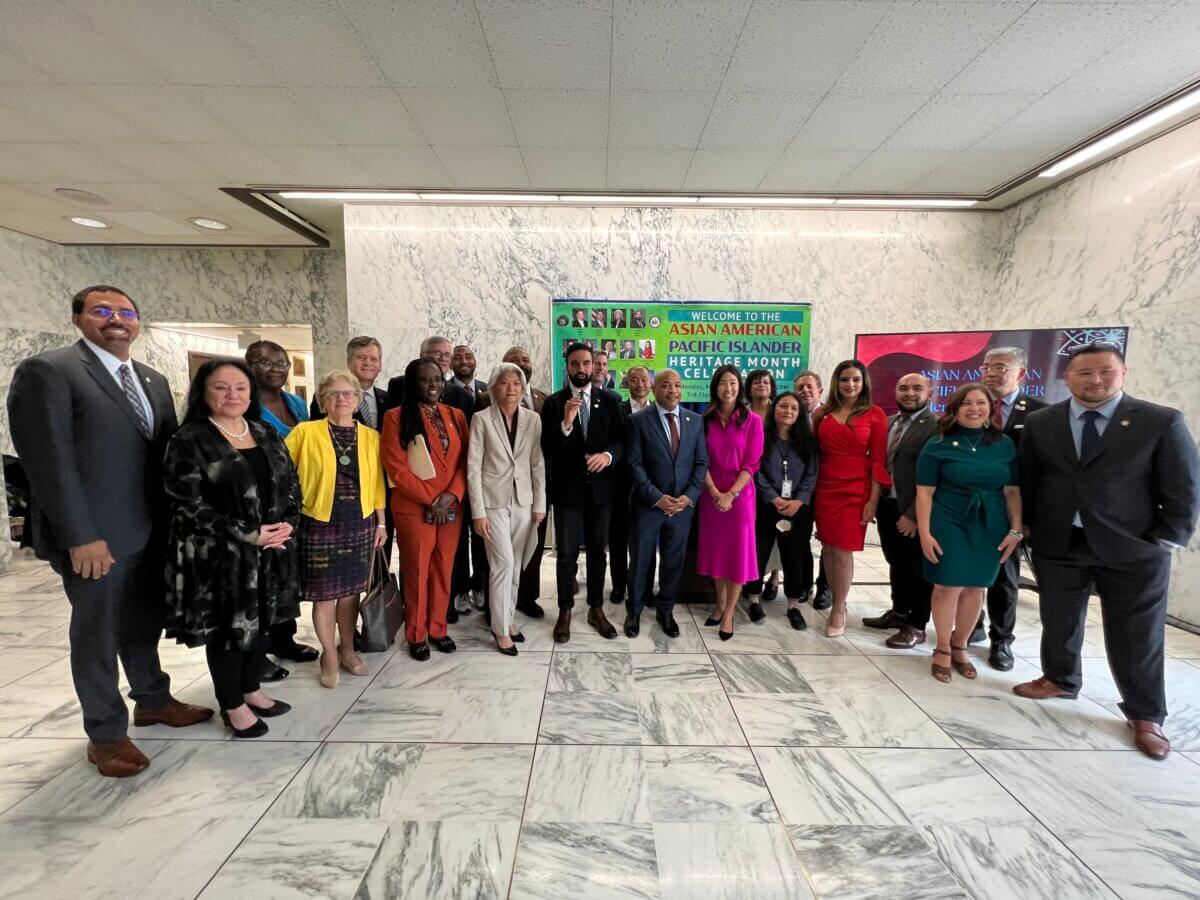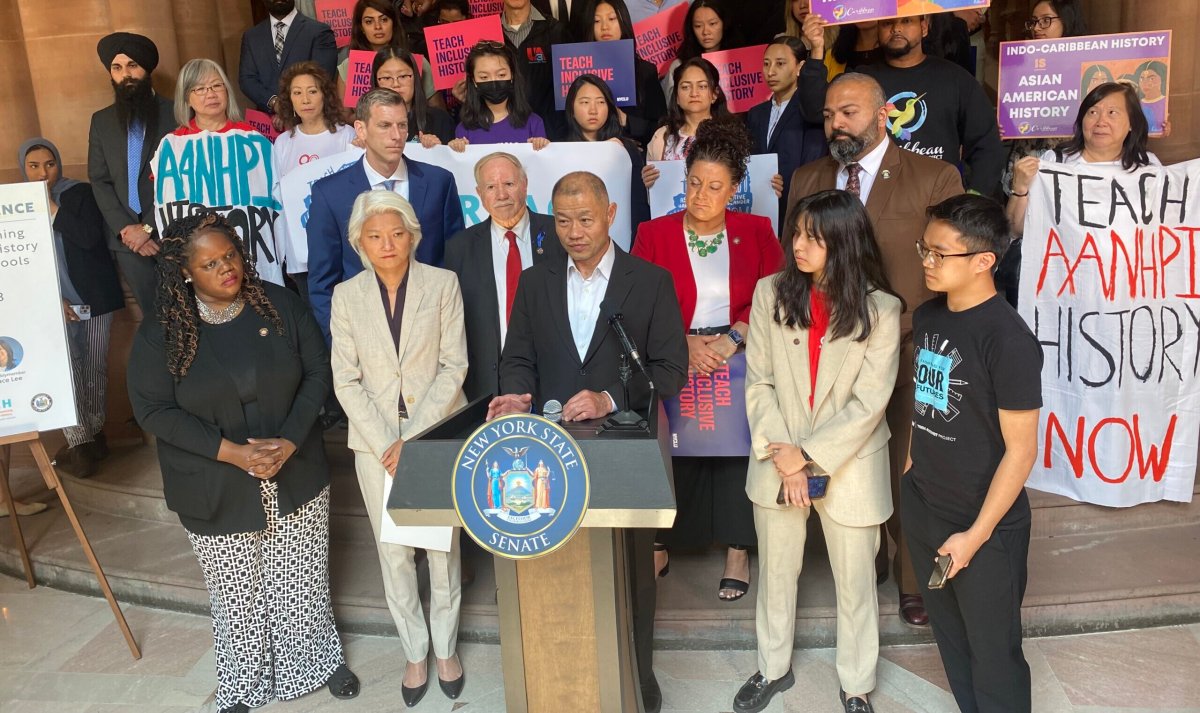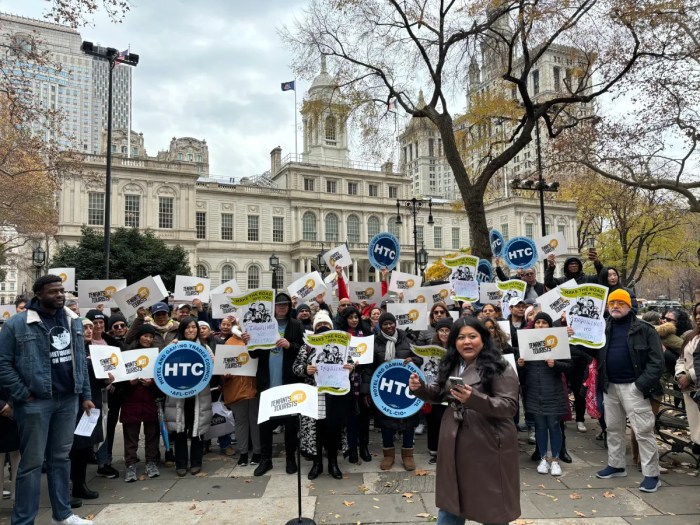Queens lawmakers and activists gathered at the state capitol in Albany on Monday, May 22, to support legislation that would require public K-12 schools in New York to include material in their curriculum that reflects Asian American, Native Hawaiian and Pacific Islander (AANHPI) history.
The group joined Sen. John Liu and Assemblywoman Grace Lee, who are sponsors of bills S5963/A06579. There was also a celebration of AANHPI Heritage Month with elected officials and the New York State Assembly Asian Pacific American Task Force.

R.E.A.C.H (Representing and Empowering AANHPI Community History) Coalition was formed in January to fight for inclusive AANHPI education measures.
The statewide coalition includes more than 170 students, parents, educators, and advocates, as well as more than 60 community-based organizations fighting for Asian American, Native American, and Pacific Islander history. The coalition intends to continue hosting Advocacy Days on an annual basis moving forward.
“From marching in the streets of Manhattan to advocating in the halls of the State Capitol in Albany, the OCA-NY chapter is proud to participate in the R.E.A.C.H. Coalition’s first Day of Action during our 48-hour Advocacy-thon for inclusive AANHPI history,” said Brianna Cea, president of OCA-NY and co-lead of the R.E.A.C.H Coalition. “In our first Advocacy Day as a coalition, we look forward to celebrating our heritage and honoring the legacy of the Asian American, Native Hawaiian and Pacific Islanders who have contributed to our rich history and collective struggle for a better country. This is just the beginning!”
Kulsoom Tapal, education policy coordinator, CACF and co-lead of the R.E.A.C.H. Coalition, said throughout history, AANHPI communities have stood alongside other historically marginalized groups in the pursuit of justice and equality. Yet, these stories of alliance and shared struggle often go untold.
“AANHPI curriculum dismantles the model minority myth by challenging the prevailing stereotypes and misconceptions and recognizing the vast diversity and complexity within AANHPI communities,” Tapal said. “The integration of AANHPI curriculum is not a mere academic exercise; it is an act of justice and recognition. It is an affirmation that AANHPI history is American history, and our stories deserve to be told.”
Jonathan Lam, a senior at Benjamin Cardozo High School in Bayside and a student leader at the Teen Activist Project at NYCLU, said the experiences of Southeast Asian immigrant communities should be highlighted in the classroom.
“Our family stories are rarely amplified and our culture is not recognized within the classroom,” said Lam, a son of Vietnamese refugees. “Being a youth leader a part of the Teen Activist Project, I’ve been able to lobby on the AANHPI Bill and organize for a more inclusive classroom throughout New York state.”
Liu, who is sponsoring Senate Bill 5963, said the legislation is vital for both supporting the identity formation of students and combating the resurgence of anti-Asian violence.
“While our Asian American communities have always been an integral part of our nation, for too long, our history and experiences have been excluded from the curriculum in our schools,” Liu said. “Teaching Asian American history will make sure that our students are afforded the opportunity to learn a more inclusive history. With the passage of the state budget this week, including a record $30 million for AAPI community-based organizations, our combined advocacy is stronger than ever.”
The significant impact of the Asian American community should be taught in schools, according to Senator Toby Ann Stavisky.
“It is time we create a more well-rounded and inclusive curriculum that better represents everyone who helped build this country and move our society forward,” Stavisky said.
Assemblyman Edward Braunstein noted that teaching Asian American history, heritage, and culture in New York’s public schools will “help stem the tide of hate and intolerance and foster respect and understanding in and out of the classroom.”
Assemblyman Steven Raga said the “groundbreaking legislation” is a profound stride toward truly inclusive education, acknowledging and celebrating the rich and diverse histories of Asian American, Native Hawaiian, and Pacific Islander communities in New York State.
“As we strive to cultivate an inclusive educational environment, let us remember that our history is not complete unless it reflects all of its participants,” Raga said.




































